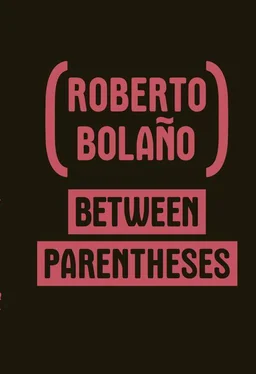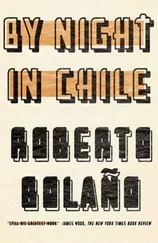Roberto Bolaño - Between Parentheses - Essays, Articles and Speeches, 1998-2003
Здесь есть возможность читать онлайн «Roberto Bolaño - Between Parentheses - Essays, Articles and Speeches, 1998-2003» весь текст электронной книги совершенно бесплатно (целиком полную версию без сокращений). В некоторых случаях можно слушать аудио, скачать через торрент в формате fb2 и присутствует краткое содержание. Год выпуска: 2011, Издательство: New Directions, Жанр: Публицистика, Критика, на английском языке. Описание произведения, (предисловие) а так же отзывы посетителей доступны на портале библиотеки ЛибКат.
- Название:Between Parentheses: Essays, Articles and Speeches, 1998-2003
- Автор:
- Издательство:New Directions
- Жанр:
- Год:2011
- ISBN:нет данных
- Рейтинг книги:4 / 5. Голосов: 1
-
Избранное:Добавить в избранное
- Отзывы:
-
Ваша оценка:
- 80
- 1
- 2
- 3
- 4
- 5
Between Parentheses: Essays, Articles and Speeches, 1998-2003: краткое содержание, описание и аннотация
Предлагаем к чтению аннотацию, описание, краткое содержание или предисловие (зависит от того, что написал сам автор книги «Between Parentheses: Essays, Articles and Speeches, 1998-2003»). Если вы не нашли необходимую информацию о книге — напишите в комментариях, мы постараемся отыскать её.
The Savage Detectives
Between Parenthese
Between Parentheses: Essays, Articles and Speeches, 1998-2003 — читать онлайн бесплатно полную книгу (весь текст) целиком
Ниже представлен текст книги, разбитый по страницам. Система сохранения места последней прочитанной страницы, позволяет с удобством читать онлайн бесплатно книгу «Between Parentheses: Essays, Articles and Speeches, 1998-2003», без необходимости каждый раз заново искать на чём Вы остановились. Поставьте закладку, и сможете в любой момент перейти на страницу, на которой закончили чтение.
Интервал:
Закладка:
And that’s the end of Chapter XXI, in which the reader has the sense of being in the presence of something completely real, not literary, or in other words deeply literary, a high point of the Adventures of Huckleberry Finn , and Chapter XXII begins where the previous chapter leaves off, with Twain going on to speak eloquently about bravery and crowds, as if the day before he’d read Canetti’s Crowds and Power , and in the same chapter he also talks about loneliness and the most desperate pride in the world, and he cross-dresses as Captain Ahab.
It’s a spare scene, though set in the middle of the chaos of a lynching. The mob reaches Sherburn’s house. There’s a small yard. The mob sets up camp, shouting (“you couldn’t hear yourself think for the noise”) from the other side of the fence. There’s a call to tear down the fence. “Then there was a racket of ripping and tearing and smashing, and down she goes, and the front wall of the crowd begins to roll in like a wave.” Only then does Sherburn appear. He’s on the porch roof and he’s carrying a double-barrelled rifle and he’s “perfectly ca’m and deliberate,” watching as his fence is torn down, and when the crowd sees him up above, they in turn stop and stare. For a while nothing happens. The stillness is perfect. The mob below and Colonel Sherburn above, watching. At last Sherburn laughs and says:
“The idea of you lynching anybody! It’s amusing. The idea of you thinking you had pluck enough to lynch a man! Because you’re brave enough to tar and feather poor friendless cast-out women that come along here, did that make you think you had grit enough to lay your hands on a man? Why, a man’s safe in the hands of ten thousand of your kind — as long as it’s daytime and you’re not behind him.
“Do I know you? I know you clear through. I was born and raised in the South, and I’ve lived in the North; so I know the average all around. The average man’s a coward. In the North he lets anybody walk over him that wants to, and goes home and prays for a humble spirit to bear it. In the South one man all by himself, has stopped a stage full of men in the daytime, and robbed the lot. Your newspapers call you a brave people so much that you think you are braver than any other people — whereas you’re just as brave, and no braver. Why don’t your juries hang murderers? Because they’re afraid the man’s friends will shoot them in the back, in the dark — and it’s just what they would do.
“So they always acquit; and then a man goes in the night, with a hundred masked cowards at his back and lynches the rascal. Your mistake is, that you didn’t bring a man with you; that’s one mistake, and the other is that you didn’t come in the dark and fetch your masks. You brought part of a man — Buck Harkness, there — and if you hadn’t had him to start you, you’d a taken it out in blowing.
“You didn’t want to come. The average man don’t like trouble and danger. You don’t like trouble and danger. But if only half a man — like Buck Harkness, there — shouts ‘Lynch him! lynch him!’ you’re afraid to back down — afraid you’ll be found out to be what you are — cowards — and so you raise a yell, and hang yourselves on to that half-a-man’s coat-tail, and come raging up here, swearing what big things you’re going to do. The pitifulest thing out is a mob; that’s what an army is — a mob; they don’t fight with courage that’s born in them, but with courage that’s borrowed from their mass, and from their officers. But a mob without any man at the head of it is beneath pitifulness. Now the thing for you to do is to droop your tails and go home and crawl in a hole. If any real lynching’s going to be done it will be done in the dark, Southern fashion; and when they come they’ll bring their masks, and fetch a man along. Now leave — and take your half-a-man with you” — tossing his gun up across his left arm and cocking it when he says this.
The crowd washed back sudden, and then broke all apart, and went tearing off every which way.
There’s no question that Mark Twain had little regard for people’s bravery. He knew a coward when he saw one. He held a similarly low opinion of other writers, in whom he scented imposture. Colonel Sherburn, who is a patient man, is also a cool killer, someone who doesn’t hesitate to shoot a foolish drunk who even raises his hands at the crucial moment (“Oh Lord, don’t shoot”) as if it had all been a joke, a stage play spun out of control. Sherburn is afflicted with a kind of inflexibility that today we would consider politically incorrect. But he’s a man and he behaves like one, while everyone else behaves like a mob or like actors, the former including the townspeople who intend to lynch him and the latter including the unfortunate Boggs, who’s ready to recite his lines but not to keep his word, the same Boggs who, without getting off his horse, asks Huck, “Whar’d you come f’m, boy? You prepared to die?”
Twain was always prepared to die. That’s the only way to understand his humor.
The Mad Inventors
The Temple of Iconoclasts is one of the best books of the twentieth century. Its author, Rodolfo Wilcock, is a legendary writer. Born in Buenos Aires in 1919, he died in Lubriani, Italy in 1978, and he was a friend of Jorge Luis Borges and Adolfo Bioy Casares. His first books were of poems: Primer libro de poemas y canciones [First Book of Poems and Songs] (1940), Los hermanos días [The Kindred Days] (1942), Paseo sentimental [Romantic Stroll] (1945). At the age of thirty-nine he went to live in Italy and began to write in Italian. Notable works from his Italian period, which was his richest, are the novel El templo etrusco [The Etruscan Temple] (1973), the prose of El estereoscopio de los solitarios [The Stereoscope of the Lonely] (1972), El Caos [The Chaos] (1974), and El libro de los monstruos [The Book of Monsters] (1978), and several volumes of poetry and plays.
His greatest work, however, is the book that has just been reissued by Anagrama. It was first published in 1982. The copy I have in my hands was published in 1999. If one considers the span between the dates of the first and second Spanish editions, it’s frankly disheartening. The Temple of Iconoclasts , which was originally published in Italian in 1972, is without a doubt one of the funniest, most joyful, irreverent, and most corrosive books of the twentieth century. Owing a debt to Borges, Alfonso Reyes, and Marcel Schwob, who in turn owe a debt, in the manner of funhouse mirrors, to the prose of the encyclopedists, The Temple of Iconoclasts is a collection of biographies of mad inventors, adventurers, scientists, and the odd artist. According to the Argentine writer Héctor Bianciotti, the book can be read “as a human comedy in which a bitter rage like Céline’s is disguised in the form of Marx Brothers gags.” I don’t think a bitter rage lurks in Wilcock’s prose, much less a bitter rage like Céline’s. When his characters are bad, they’re bad because they’re so good, and when they’re good they’re oblivious, and then they’re frightening, but only as frightening as the rest of humankind. Wilcock’s prose — methodical, always confident, unassuming even when it deals with lurid or over-the-top subject matter — tends toward understanding and forgiveness, never bitterness. From his humor (because The Temple of the Iconoclasts is essentially a comic novel) no one is safe.
Some of his characters are real historical figures, like Hans Hörbiger, the Austrian scientist who advanced the theory of successive moons and counted Hitler among his disciples. Others might as well be, like André Lebran, who is “remembered, occasionally remembered, or in fact not remembered at all, as the inventor of the pentacycle or the five-wheeled bicycle.” Some are heroic, like the Filipino José Valdes y Prom, telepath and hypnotist. Others are wholly innocent creatures or saints, like Aram Kugiungian, an Armenian immigrant in Canada, who is reincarnated or transmigrated into hundreds, maybe thousands of people, and who always says, when confronted with the evidence, that he feels “nothing unusual, in fact nothing at all, at most a vague sensation of not being alone in the world.” Not to mention Llorenç Riber, the Catalan theater director capable of wearing down not only the most brutal censors but also his occasional audiences by staging an adaptation of Wittgenstein’s Philosophical Investigations . Or the Canarian inventor Jesús Pica Planas, father of the revolving grill turned by four turtles or of elastic underwear for dogs in heat or of a photoelectric mouse trap complete with guillotine, to be placed in front of mouseholes. Thirty-five biographies like these make this a festive, laugh-out-loud read, a book by one of the greatest and strangest (in the revolutionary sense of the word) writers of this century, a writer whom no good reader should miss.
Читать дальшеИнтервал:
Закладка:
Похожие книги на «Between Parentheses: Essays, Articles and Speeches, 1998-2003»
Представляем Вашему вниманию похожие книги на «Between Parentheses: Essays, Articles and Speeches, 1998-2003» списком для выбора. Мы отобрали схожую по названию и смыслу литературу в надежде предоставить читателям больше вариантов отыскать новые, интересные, ещё непрочитанные произведения.
Обсуждение, отзывы о книге «Between Parentheses: Essays, Articles and Speeches, 1998-2003» и просто собственные мнения читателей. Оставьте ваши комментарии, напишите, что Вы думаете о произведении, его смысле или главных героях. Укажите что конкретно понравилось, а что нет, и почему Вы так считаете.












